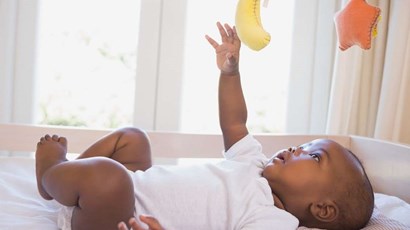Newborn Hearing Test
Your baby will be offered a hearing test in the first few weeks. This is a very quick test and does not cause the baby any pain.
When will my baby's hearing be checked?
This is usually done before you and your baby leave hospital, but can also be done at home or in a special clinic if not. It takes only a few minutes and you will get the result straight afterwards.
The National Institute for Health and Care Excellence (NICE) has issued new guidance on postnatal care, including newborn hearing tests.
They recommend that your baby's hearing test should if possible be carried out in the first 4-5 weeks after they are born. However, if this is not possible it can be carried out before your baby is 3 months old.
Hearing loss in babies is uncommon, only affecting around one to two babies in every thousand. However, it is important to have these tests done so that your baby can be referred to a specialist if there is any suggestion of a hearing problem.
How is hearing checked?
The test most commonly undertaken is the Automated Otoacoustic Emission (AOAE) screening test. It is very commonly done in the first day or so of birth. The test involves a technician placing a very soft probe into your baby's ears which is connected to a machine. This shows how well your baby is hearing.
The test takes just a few minutes and should not be distressing for your baby.
If this test is not normal then this does not necessarily mean that your baby cannot hear. The test could have been abnormal, or the responses may not have been clear, because of background noise or because your baby was unsettled.
If the first test is not normal, your baby may be offered a repeat test. Alternatively, they may be offered a more specialised test, which is the Automated Auditory Brainstem Response (AABR) test at a later date. This test involves placing three small sensors, together with headphones, on to your baby's head. The headphones are placed over your baby's ears. The machine measures how well the sounds travel along your baby's hearing nerve pathways from their ear to their brainstem.
If your baby spent more than 48 hours in a neonatal intensive care unit (NICU) or special care baby unit (SCBU) then they may be offered the two different hearing tests.
What if the test results are not normal?
If the results of your baby's hearing screening are not clear (in one or both of their ears), they will be given an appointment at a specialist hearing clinic. This appointment usually takes 1-2 hours. Do try to feed your baby before your appointment and bring everything they need to keep them comfortable with you.
Remember that even if your baby needs referral, this does not automatically mean they have a problem with their hearing. A hearing specialist called an audiologist will carry out tests on your baby's hearing. They should be able to give you the results before you leave the clinic. If your baby needs more tests, they will arrange this for you.
Further reading and references
Postpartum care; NICE Guidance (April 2021)
Newborn screening; NHS Choices
Newborn screening; NI Direct Government Services
